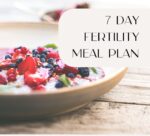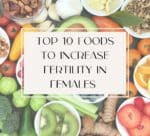I recently read a few studies that looked at the food intake of women undergoing IVF cycles. Usually, when reading these studies, food patterns are analyzed more than individual food items or ingredients. So, I have taken all that information and summarized it for you here, in this easy-to-follow, nutrition guide for your IVF cycle.
This article is a quick go-to guide on which types of foods have been shown to be related to improved pregnancy and live birth outcomes. Now, before we start, it is important to know the timing. If you have your IVF cycle scheduled for next week or even next month, nutrition intervention changes are not as robust with this limited time frame. If you are planning or thinking one day that IVF may be in your future, it’s time to get started on your fertility-eating food patterns now, as it could take a minimum of 3 months to take into effect.
If you need help with any of the information you find on this page, I am here to help. You can book a call with me on my bookings page. I offer meal plans that include grocery lists and personalized portions. If you think to yourself “My life is so busy already, how am I supposed to start doing this now too?” I can with that too.
So, here are the 2 questions I will be answering in this article.
- How to tailor your diet leading up to egg retrieval?
- What to eat after an embryo transfer?
So, let’s dive in!
Nutrition for your IVF cycle
1. How to tailor your diet leading up to egg retrieval?
1. Look for foods that are high in antioxidants
- Add colourful veggies and/or fruits to each meal or snack, specifically:
- dark leafy greens
- raspberries, blueberries, strawberries, pomegranates, blackberries
- citrus fruits like lemons, oranges, limes
- dark purple colours from beets, eggplants, blueberries,
- cruciferous vegetables like broccoli, Brussel sprouts, cauliflower
- Use fresh herbs:
- parsley, thyme basil, oregano, chives, mint
- Include spices
- ginger, turmeric, cinnamon
2. Include Foods that help with Blood Glucose and Insulin levels
- Eat Whole grains when eating grains
- quinoa, barley, farro, wild rice, buckwheat, oats
- Lean proteins
- fish, eggs, beans, lentils, tofu, poultry
- Fibre-rich foods
- fortified cereals, avocado,
- Ensure the timing of your intake is every 3-4 hours through the day (all cases are specific).
3. Include Foods that Help with Blood Flow and are Anti-inflammatory
Anti-inflammatory agents are key for improving fertility health.
- Omega 3-rich foods
- Salmon, tuna, sardines, herring
- Walnuts, flaxseeds, chia seeds.
- Foods rich in Vitamin E
- Sunflower seeds, almonds, peanuts and peanut butter, beet greens, collard greens, spinach
4. Don‘t forget the Dairy
Dairy, and yes I mean cow’s milk dairy, has been shown to be well supported in fertility research. It seems that even the full fat dairy (3%MF or more) is the one of choice too! I know, surprising to me as well, but this is what the research shows us.
Go for dairy sources like Greek yogurt, Kefir, cheese, and milk.
2. What to Eat after An Embryo Transfer
When reviewing healthy snack ideas, keep in mind that a mix of protein, fats and complex carbohydrates will keep help you feels satifyied, help you feel full longer, help alleviate predinner hunger cravings and will help you meet your intake needs during the day. Look for snacks that have a combination of one or all three of these macronutrients.
Combined Macronutrient Snack ideas:
Fruit and nuts
Yogurt Parfait (my favourite – yogurt with berries and nuts)
Trailmix
Boiled egg and whole grains
Hummus with veggies
Whole grain crackers with cheese
Tips to be Mindful Of
6. Enjoy Your Food
This is a simple statement with a large impact. Becoming actively tuned into the foods you eat, where you intentionally pay attention to the food in front of you, can be beneficial in many ways. This allows you to become more aware of the taste, texture and aroma of the food, it also connects your mind and body to what you are eating and how much. Enjoying your food also includes , prepping meals or snacks together with your family. It also helps you make healthier choices, be more conscious of your eating habits and create a sense of awareness around your daily decisions.
7. Drink Water
Water is needed in every bodily function, either directly or indirectly. Water helps the blood flow, the cells work and the organs pump. It allows the nutrients to get where they need to go, aids in body temperature control, gut function, immune health and mental function. In the grocery store, there are aisles and aisles of beverages to choose from and a lot of them have added sugars and additives. If you can, just head to the next aisle and stick with water as your primary beverage choice. To add a little variety, you can always flavour your water too.
Flavours you can add to water:
Citrus fruits like lemon, limes, oranges or grapefruits
Watermelon and Mint
Strawberries and Basil
Cucumbers and Mint
Peaches and vanilla bean
8. Focus on Colour
There are 5 colour groups that food comes in: Purple/Blue, Green, Orange/Yellow, Red and White/Light Grey. These colours give us phytonutrients and phytochemicals that are super beneficial for our body. The more colour on your plate, the more variety of nutrients your body will receive and the decreased chances of nutrient deficiency. When searching for healthy snack ideas, choose the ones that offer the most colour variety!
Tips to be Aware Of
9. Distractions
Distractions while eating take away from your ability to eat mindfully. Mindful eating includes being aware of how you eat, why you are eating, what you are eating, when you are eating, where you are eating and how much you are eating. Ideally, turning off the phone, TV, laptop and other devices can help you tune in to your intake and become aware of what your body is telling you. Are you hungry or bored, are you stress eating, are you full, are you enjoying your meal or snack? These are all important aspects of healthy eating in that you connect your body with your mind and this is super important in creating and maintaining a healthy relationship with food.
10. Processed Foods
Processed foods get a bad rap so let’s be real here, these foods fall on a spectrum from minimally processed to heavily processed and include cooked, canned, frozen, packaged or any food that is changed in nutritional composition via fortifying, preserving or preparing in different ways. Frozen fruits and vegetables, for example, can be optimal in that they are processed at their peak ripeness, locking in nutrient quality. Canned vegetables can also come in handy and offer a quick and good alternative when making tomato sauce or soups. The part we need to be aware of is the hidden salts, sugars, additives, and other ingredients that come with processed food. Be sure to read both the ingredient label and nutrient facts table so you become aware of what you are buying and what you will be eating.
11. Healthy Can Come in Many Sizes
Every person has their own unique body shape, size, height, colour and look and this is something to celebrate. Making healthier choices and being at peace with other choices, comes with a lifelong journey of acceptance and self-kindness. Healthy eating can contribute to feeling better, having more energy, improving your blood markers, getting better sleep and increasing your mood overall. When deciding on snack options on the go, remember to be kind to yourself and enjoy the moments you are able to take for yourself.
The Quick Summary
This list of healthy snack ideas helps to maximize nutrients, provide mindful eating tips and alleviate the stress that comes with being hungry. Hence why, whether working from home, at the office or on a day when you are bombarded with no stop interruptions (aka children, a pet puppy, a cat that likes the keyboard, your spouse that can’t find the……….whatever it is!). I hope this list helps you in alleviating some stress to make faster, more confident, healthier decisions amongst the long list of decisions we make daily.
If you are interested in knowing more about specific nutrition information that can be tailored made to your needs or want to leave me a kind comment, contact me in the link below.





Leave a Reply
You must be logged in to post a comment.